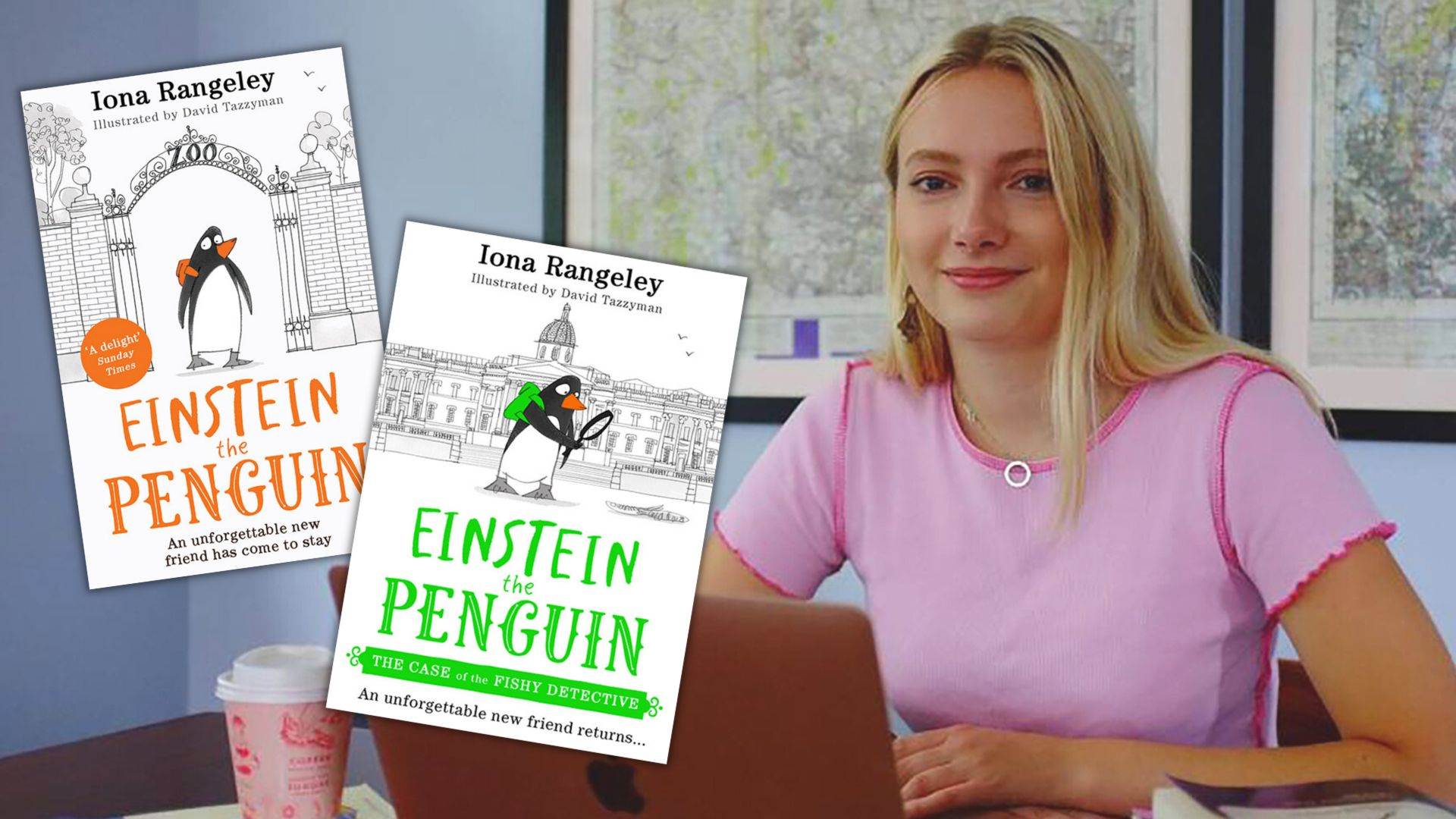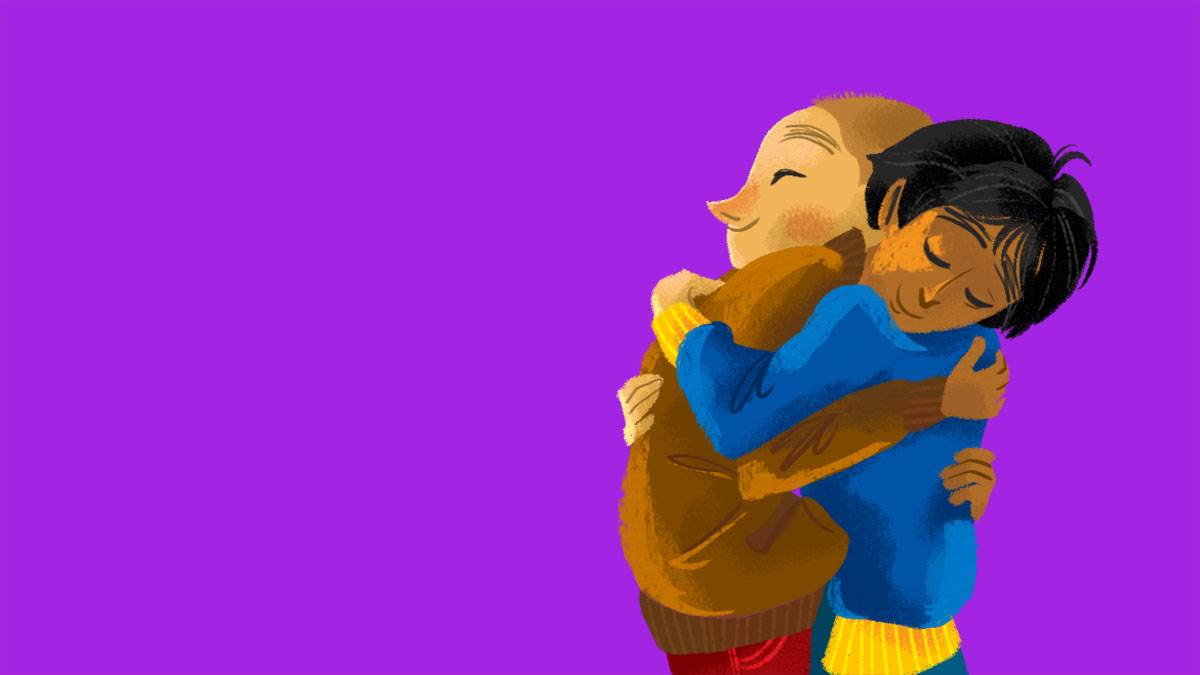What children's books can teach us about friendship
Published on: 01 November 2022
Iona Rangeley, author of the Einstein the Penguin series, shares her thoughts on friendship.
 Author Iona Rangeley and the covers of two Einstein the Penguin books
Author Iona Rangeley and the covers of two Einstein the Penguin books
Penguins: the perfect icebreaker
Towards the end of Einstein the Penguin, Arthur who, with the help of Einstein, has finally made a best friend at school, suddenly worries about whether Theo will still want to be his friend once Einstein has returned home to Australia.
"We only made friends because of Einstein," he says.
His big sister Imogen corrects him: "You only spoke to him because of Einstein," she says. "That’s not the same thing."
Despite her wisdom, in The Case of the Fishy Detective Imogen ends up with friend troubles of her own. Her best friend Amy inexplicably replaces her with the new girl and no longer wants anything to do with her. But the new girl turns out not to share Amy’s meanness, and at the promise of penguins ends up coming over for Imogen’s birthday, they get on brilliantly.
Both Imogen and Arthur end up using Einstein to form friendships with other children, which makes sense: having a penguin at home or in your school bag would be something of an ice breaker. But the friendships last when Einstein isn’t there, too. He simply helps them find common ground, a shared interest and something to talk about.
Finding common ground
Most friendships start with common ground, whether big or small. That could mean a shared love of penguins, a favourite book series, or even being in the same place at the same time, like on a particular desk in a particular class at school.
I went to a boarding school, and my most long-lasting friendships from my time there are with the people I shared a bedroom with in my first year. We bonded over a similar sense of humour, putting on plays and making “movies”, and sharing the same books (at the time this was mostly my copies of The Hunger Games).
I’m still friends with many of those people today, even if we no longer make zombie movies together, have lights out at the same time or are particularly interested in the same books. Just as Arthur and Theo remain friends even after Einstein goes home to Sydney, the initial common ground that helps form friendships doesn’t always stick around. But the best friendships go beyond common ground. You might find the friend you had everything in common with age seven, you no longer have much in common with age eleven. But that doesn’t have to mean the friendship is over, because the longest friendships are just as much about how well you know each other and how much you respect each other as they are about liking the same things.
 Illustration: Erika Meza
Illustration: Erika Meza
Not all friendships are meant to last
When Amy stops talking to Imogen, she proves herself to be a bad friend. Not all friendships will, or are supposed to, last forever. But one important thing to remember as you navigate friendships is that we are all, inevitably, both good friends and bad ones. Even if Amy is a very bad friend to Imogen, she may well turn out to be a very good friend to somebody else. Just as we’re all capable of making our friends happy and being there for them when they need us to be, we all make mistakes, say insensitive things or don’t speak up for our friends when we ought to.
Of all the friendships in the world, there are very few that haven’t gone through arguments and disappointments.
At the start of The Case of the Fishy Detective, for example, Imogen is not being a very good friend to Arthur by refusing to share certain details of the case with him. She’s too preoccupied by wanting to solve everything herself to consider that her brother might actually be able to help her. But Imogen learns from this, and admitting her mistake takes them a step closer to solving the mystery. None of us are perfect within friendships, but the very best friendships are the ones that help us to become better people.
How books can help us make friends
Of course, one very helpful tool in teaching us how to be a good friend is books. This could be in a very simple way. Just as I shared books with my friends at school, you might discover the new child in your class likes the same books that you do, and that in itself might be the start of a brilliant friendship.
But books have a power even stronger than that, which is the ability to show us things from somebody else’s point of view. Perhaps you’ve read a book in which two characters have a falling out. As the person reading that book, it was probably quite easy for you to imagine how they were both feeling. But if that falling out happened in real life and you were in the middle of it, this might be a lot more challenging. Next time you have an argument with a friend, it might be an interesting experiment to try writing a story about it from their point of view. You might find that they’re not so unreasonable or mean after all.
What books teach us, in the end, is that everyone – even the people we don’t get on with – has a story, and a reason for being the way they are. Maybe the person at school who’s mean to everyone is having struggles of their own, and simply letting it out in the wrong way. Maybe the new student who’s very quiet and doesn’t seem to want to make friends has just moved from abroad, and is feeling daunted and nervous, or isn’t confident speaking your language.
Just as we’re all the main characters in our own stories, with our friends and family members as the secondary characters around us, everyone you see – from your classmate, to your teacher, to the person you sit next to on the bus – is the main character in a story of their own. They all have things that make them happy, things that they’re worried about, things that make them sad. It’s important to remember this when you interact not only with your friends, but with strangers, too. You’ll be a better friend because of it.
You might also like...
Check out our recommendations for children's books all about friends.
Books about friendship
Can you imagine Pooh without Piglet? Or Frodo without Sam? Here are some children's books that celebrate the power, fun and wonder of friendship.
Books about friends for younger readers
Some of the very best picture books all about friendship - perfect for preschoolers and younger.
Topics: Friendship, Everyday life, Features







